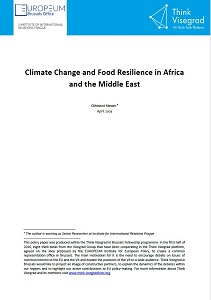Climate Change and Food Resilience in Africa and the Middle East
Climate Change and Food Resilience in Africa and the Middle East
Author(s): Clément Steuer
Subject(s): Supranational / Global Economy, Security and defense, Politics and Identity
Published by: EUROPEUM - Institut pro evropskou politiku
Keywords: global crises; resilience; European Green Deal;
Summary/Abstract: The Russian war in Ukraine destabilized supply chain and put under stress African and Middle Eastern food systems, emphasizing their vulnerability and the need to improve their resilience. Climate change represents an even more ominous challenge in this regard, adding pressure on land and water and reducing yield growth. In a globalized world, this issue cannot be relegated to humanitarian assistance or development partnerships. The European Green Deal and agriculture policies affect food systems in the Global South. Conversely, current, and future food crises threaten economic and political stability of African and Middle Eastern countries, and consequently economic interests and geopolitical security of the European continent (food shortage, migrations, collapsed states becoming a haven for terrorist organizations). Visegrad countries (V4) have been affected by the war and the rerouting of Ukrainian grains. Due to the repercussions of the solidarity lanes on their own agricultural production, food resilience in the Southern neighbourhood and Sub-Saharan Africa should become a priority for them. They have the capacity to play a role in the collective European effort in this matter.
Series: EUROPEUM - Policy Papers
- Page Count: 13
- Publication Year: 2024
- Language: English
- Content File-PDF
- Introduction

